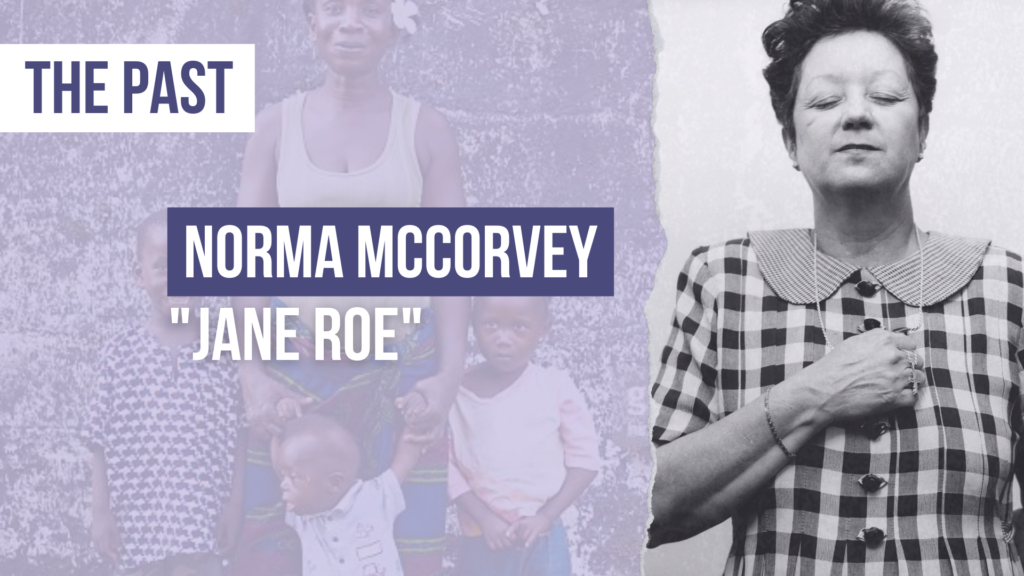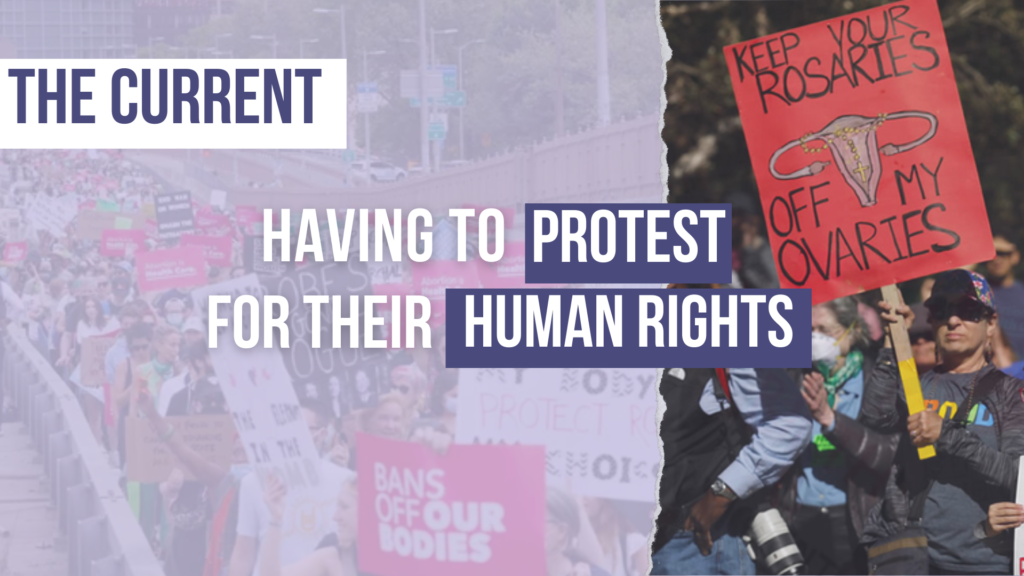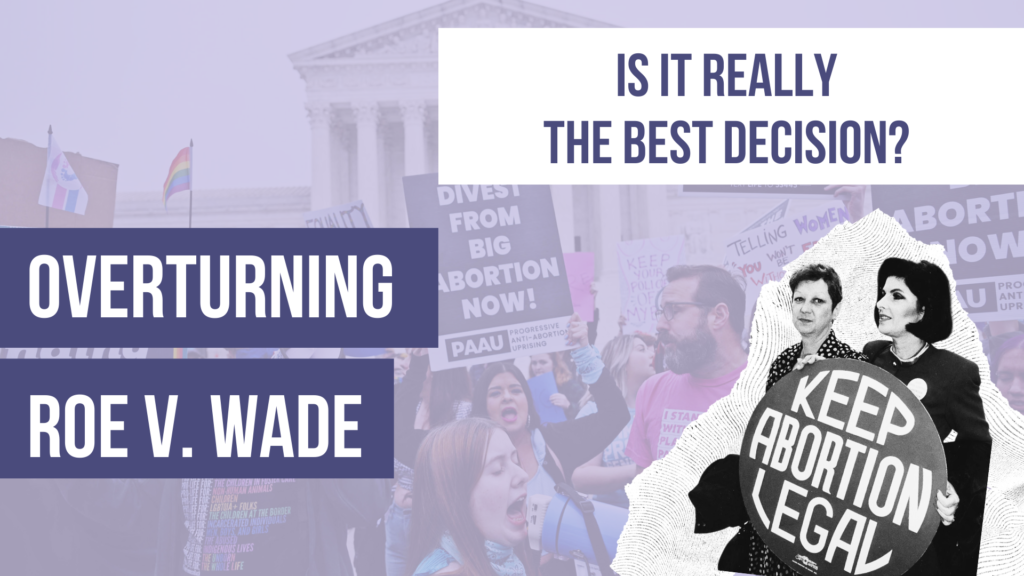Written by Krithika Elamaran & Kaylene Lim
The landmark 1973 Roe v Wade ruling was overturned by the United States Supreme Court in June this year, effectively removing a woman’s constitutional right to an abortion.
All around the world, strong responses were seen on social media and across the media landscape from both opponents and proponents of the decision.
Roe v Wade was a legal decision issued on January 22, 1973, in which the US supreme court effectively legalized abortion across the United States. The court held that a woman’s right to an abortion was implicit in the right to privacy protected by the 14th amendment to the constitution. Prior to Roe v. Wade, abortion had been illegal across most of the country since the late 19th century. Now in 2022, Roe V. Wade has been overturned and now 26 states in America are certain or likely to ban abortion.
Here’s our rundown of what has been happening so far.

the past
It all started with a woman named Norma McCorvey, a Texan woman in her early twenties. McCorvey lived a life of poverty and had given birth twice, later putting her biological children up for adoption. However, she got pregnant a third time and was looking for ways to get rid of an unwanted pregnancy. This took place in the year 1969 when there were laws stating that abortions were illegal unless the child was compromising their mother’s health. Due to her monetary conditions, McCorvey could not afford trips to other states in the U.S to carry out an abortion without the restraints of state laws.
Fortunately, McCorvey’s dilemma was sought out by Sarah Weddington and Linda Coffee. Being attorneys in Texas who were also keen on taking down their state’s rigid anti-abortion laws, the women were interested in assisting McCorvey’s fight for justice.
Enter Henry Wade; the district attorney of McCorvey’s current town, Dallas County. Wade intended to prosecute doctors performing abortions as the state’s abortion law allegedly disregarded a constitutional right to privacy. Hence, a Texas district court ruled that the state’s abortion ban was illegal in June 1970.
Weddington and Coffee filed a lawsuit on behalf of all the women who were wronged by the anti-abortion laws in their state, with the lawsuit even getting appealed to the U.S Supreme Court.
Finally, on 22 January 1973, the U.S Supreme Court took down the anti-abortion law in Texas with a whopping majority of 7-2. Supported by the 14th amendment, stating that no U.S state shall make or enforce any law that takes away the privileges or immunities of U.S citizens, it was officialised by the court that a woman possessed the right to abort her child.
Wondering why the law is not named McCorvey v. Wade? Court documents filed McCorvey’s name as “Jane Roe”.
With the Supreme Court being official with their laws, Roe v. Wade bore the name up till today.

the present
Now in 2022, Roe v. Wade has been overturned and the 26 states in America are certain or likely to ban abortion. This marks the first time in the history of the US that the court has taken away a constitutional right.
This means women do not get a say about their choices and will be forced to see through the pregnancy. Roe v. Wade being overturned is likely to affect the lower-income community more as while wealthier women may still travel to other countries such as New York where abortion is still legal, those who have financial difficulties do not have that option.
Moreover, Roe v. Wade affects the economy as women now may find it harder to attain a higher education due to financial restraints, thus leading to difficulties finding a job in the future. They would have lesser chances of joining the labour force, leading to increasing rates of debt and poverty. Citizens across states in the U.S such as South Carolina, Philadelphia, Denver, and Washington D.C stood together in the form of protests as they expressed their anger toward Roe v. Wade’s overturning.
Even countries outside of the U.S are rallying against the overturning. Protestors were present outside of the U.S embassy in Dublin, Ireland on June 26; so were protestors from the U.K doing the same thing outside of the U.K’s American embassy in London, England.
Some of these protests have been met with police restraint. For example, a taser was drawn in a protest located in the city of Greenville, South Carolina. The police used physical force to detain six people for disorderly conduct and resisting arrest, three out of six of them being a young woman, an elderly man, and an elderly woman.
Tear gas was also included in the police’s arsenal in detaining the opposing crowds, a similar tactic used by law enforcement during past protests such as Black Lives Matter protests in the U.S and Hong Kong’s Democracy Movement crowd dispersion.
While the effects of Roe v. Wade do not directly impact Singaporeans, many youths do have strong opinions of the situation.
Ezryna Alysha, 17, a Year 1 student at Temasek Polytechnic (TP) said: “I think it is honestly very sad that safe abortions are going to be banned in the US. I personally believe that you cannot ban abortions, you can only ban safe abortions and I can forsee that many people are going to put their lives at risk just to end their pregnancies.”
Similarly, Semran Rai, 18, a fellow TP first-year student felt that the ban was “inhumane and disrespectful”.
She added: “It is really unfair that the rights of those women are being snatched without considering the effects it will have on them.”




